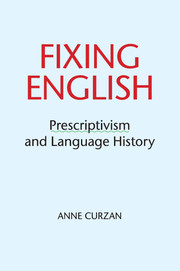Book contents
- Frontmatter
- Dedication
- Contents
- List of figures
- Acknowledgements
- Introduction: does prescriptivism fail?
- 1 Prescriptivism’s umbrella: standards, style, restoration, and political intervention
- 2 Prescriptivism’s lessons: scope and “the history of English”
- 3 Checking grammar and grammar checkers
- 4 Dictionaries and the idea of “real words”
- 5 Nonsexist language reform and its effects
- 6 Reappropriation and challenges to institutionalized prescriptivism
- 7 Finding shared ground: public conversations about prescriptivism
- References
- Index
5 - Nonsexist language reform and its effects
Published online by Cambridge University Press: 05 July 2014
- Frontmatter
- Dedication
- Contents
- List of figures
- Acknowledgements
- Introduction: does prescriptivism fail?
- 1 Prescriptivism’s umbrella: standards, style, restoration, and political intervention
- 2 Prescriptivism’s lessons: scope and “the history of English”
- 3 Checking grammar and grammar checkers
- 4 Dictionaries and the idea of “real words”
- 5 Nonsexist language reform and its effects
- 6 Reappropriation and challenges to institutionalized prescriptivism
- 7 Finding shared ground: public conversations about prescriptivism
- References
- Index
Summary
Nonsexist language reform, or the set of efforts to make the English language more equitable to and inclusive of men and women, falls under the more general heading of “politically correct” language reform. The scare quotes around “politically correct” in that sentence are highly intentional, designed to emphasize the charged and problematic nature of this term at the beginning of the twenty-first century. The phrase “politically correct” has undergone semantic pejoration (that is, its meaning has become more negative) such that it no longer refers neutrally to efforts to reform language in order to make it more respectful and inclusive of all persons, but instead suggests overly sensitive if not silly and unnecessary efforts to change language “at the whim” of underrepresented groups and their advocates.
Politically correct language and the efforts to promote it are regularly ridiculed in the public arena. Fabricated language reforms such as personhole cover for manhole cover and vertically challenged for short are held up as symptomatic of the movement’s excesses. I call these fabricated because I have never actually heard any advocate of nonsexist language reform seriously propose personhole cover or anyone proposing any kind of language reform make a serious case for vertically challenged. Yet they can show up side by side with more common, even at this point mainstream reforms such as Native American for Indian, African American for Black. If Urban Dictionary provides a snapshot of attitudes about the term political correctness, the term’s negative connotations have gone beyond silly and unnecessary and now include manipulative, harmful, and silencing. The first definition in Urban Dictionary in Fall 2012 (which means it had the best ratio of thumbs up to thumbs down) read: “Organized Orwellian intolerance and stupidity, disguised as compassionate liberalism.”
- Type
- Chapter
- Information
- Fixing EnglishPrescriptivism and Language History, pp. 114 - 136Publisher: Cambridge University PressPrint publication year: 2014

